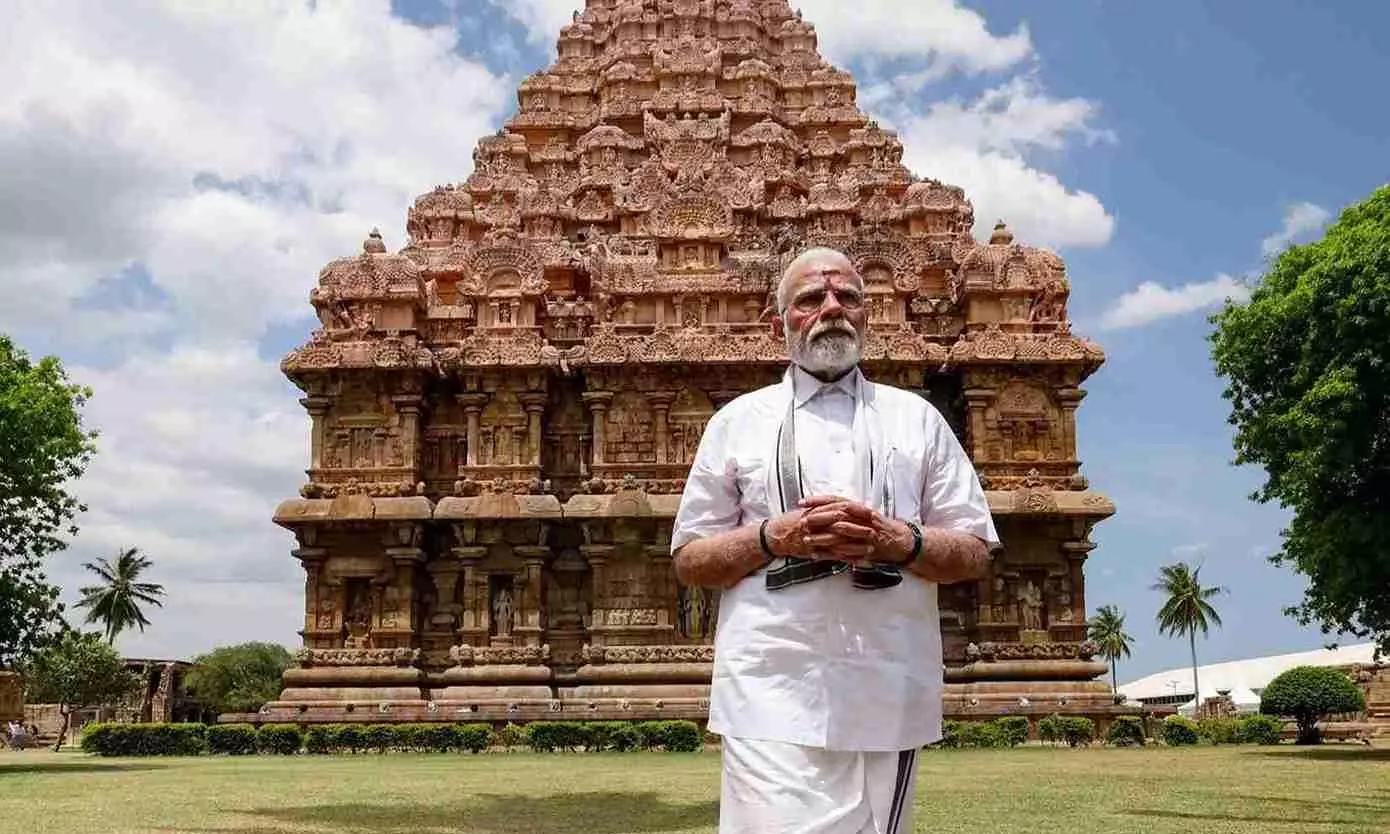
Battle for Chola legacy: DMK, BJP jostle to claim Tamil pride in Thanjavur
With PM Modi's visit coinciding with Rajendra Chola's birth anniversary, both parties mix cultural symbolism with infrastructure promises ahead of 2026 polls

In what is turning into a high-stakes cultural and political tug-of-war, both Tamil Nadu’s ruling party DMK and the BJP, which is at the helm at the Centre, are attempting to position themselves as the true inheritors of Tamil heritage, particularly the Chola legacy.
With Prime Minister Narendra Modi’s visit to Thanjavur on Sunday (July 27) and the DMK’s parallel cultural programmes and infrastructure announcements this week, the ancient temple town has become the latest stage for identity politics and developmental symbolism.
Modi’s strategic schedule
The Chola dynasty ruled much of South India and parts of Southeast Asia between the 9th and 13th centuries. On a landmark day for Tamil Nadu politics, Prime Minister Modi made a high-profile visit to Thanjavur and attended the Aadi Thiruvathirai festival at the Gangaikonda Cholapuram temple and inaugurated several key infrastructure projects.
His visit was strategically scheduled to coincide with the Aadi Thiruvathirai festival, observed as the birth anniversary of Rajendra Chola I. The DMK government officially declared Aadi Thiruvathirai as a government festival in 2021.
Also read: Modi in TN: Op Sindoor proved there’s no safe haven for India’s enemies
Focus on Cholas
Ahead of the 2026 Assembly elections in Tamil Nadu, both state and national parties have announced projects that mix cultural symbolism with infrastructure promises, particularly in the land of the Cholas.
Earlier this week, Tamil Nadu Finance Minister Thangam Thennarasu announced that the Cholagangam tank, also known as Ponneri, a massive waterbody developed by the Chola kings near Gangaikonda Cholapuram in Ariyalur district, would be redeveloped as a tourism destination at a cost of Rs 19.2 crore.
In addition to the already announced Chola museum, the DMK government added the Ponneri redevelopment project to underscore its attention to Chola heritage.
On the other hand, the BJP chose to commemorate Rajendra Chola’s legacy by releasing a commemorative coin and announcing a slew of infrastructure projects for Thanjavur and nearby districts.
Also read: Will Modi’s ‘Chola gamble’ earn rich dividends?
Hindutva and Tamil pride
Prime Minister Modi’s roadshow in Thanjavur was viewed as a major success by BJP leaders in Tamil Nadu. Meanwhile, many local residents welcomed the fact that both the DMK and BJP appear to be competing to deliver more as the assembly polls heat up in the months ahead.
M Sundari (52) was among the hundreds of residents who witnessed Prime Minister Modi’s roadshow.
“I’m not a party cadre of any political party, but I’m happy to know that the prime minister is visiting my town. My place is getting prominence. As a local resident, I used to feel that the importance of my town wasn’t celebrated as much as it deserved. But now, I can see all the parties fighting to connect with the legacy of our town,” said Sundari.
Speaking at the event, Prime Minister Modi hailed the Chola Empire as an “ancient roadmap for Viksit Bharat” and urged the nation to draw inspiration from the Cholas’ maritime strength, administrative capabilities, and public infrastructure. His speech clearly signalled the BJP’s intent to blend Hindutva cultural motifs with Tamil pride and infrastructure delivery.
Also read: With Modi's TN visit, why Rajendra Chola will get the spotlight back
Eye on infrastructure
Projects such as turning NH-36 between Sethiathope and Cholapuram into a four-lane road — a vital enhancement for delta region connectivity — for Rs 2,350 crore, and the electrification of the 228-km Villupuram-Mayiladuthurai-Thanjavur railway line, aim to modernize transport across the delta districts.
Apart from the commemorative coin, Modi also announced the Grand Anicut Canal System modernization project worth Rs 2,640 crore — a move widely seen as thoughtful and strategic. The initiative is expected to improve irrigation for over 2.27 lakh acres in Thanjavur, Ariyalur, and Pudukkottai districts.
Modi speaks Tamil
Possibly to thwart any attempts to accuse his party of Hindi imposition and cultural alienation, Modi spoke in Tamil in parts of his address and reiterated that “no other Indian language has the global antiquity of Tamil”.
He also wore traditional attire during his temple visit. Political observers noted that these are obviously intended to soften the BJP’s image in the state.
While the BJP’s development push, including in transport, rail, port, and irrigation, presents a governance-forward narrative, its real challenge lies in convincing Tamil voters that it truly understands and respects their identity.
Also read: PM Modi to release coin of Rajendra Chola on July 27
History and identity
The DMK, with its strong cultural roots and Tamil-first politics, has tried to insulate its voter base by launching similar development schemes grounded in Dravidian ideology.
Speaking to The Federal, senior journalist R Bhagwan Singh said, “Both the DMK and the BJP know that in Tamil Nadu, history and identity matter deeply. The Cholas represent a glorious past; whoever controls the narrative around them controls a key emotional lever. In Thanjavur, where rice fields and Chola temples coexist, identity politics and developmental promises are no longer separate conversations; they’re part of the same battlefield.”
He added, “The DMK has long controlled the Tamil identity discourse, rooted in Dravidian ideology, rationalism, and anti-imposition politics. The BJP’s efforts to embrace the Chola legacy, including Modi invoking Tamil kings in national speeches, signal a calculated ideological expansion.”
Singh also pointed out that while political mileage is clearly a motivating factor in these announcements, the projects could help boost cultural tourism and local livelihoods in Thanjavur, a Tier-II city with immense heritage potential.

